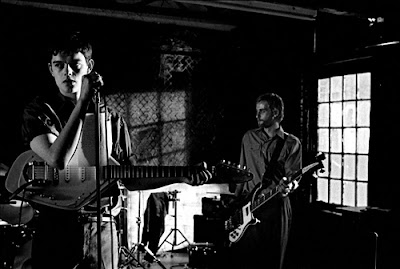 Control is a stark and devastating portrait of a young man whose life was cut short by his own hands. The story is tragic and harrowing. Thankfully in the hands of first time director Anton Corbijn, this film about the short and sad life of Joy Division singer Ian Curtis is beautifully handled. Filmed with incredible skill and care I was left feeling anguished by this biopic's crushing humanity and deliberate sadness. Admission one: I was and am a massive Joy Division fan. As a teenager I was struck by the agonising poetry and majestic music of the fabled Manchester band. So any film concerning this subject will be welcomed by me, but conversely I also have extremely high hopes that any film will live up to this lofty subject. I can safely report that the film is a resounding success, aesthetically and emotionally. As a drama of human crisis and as a tale of a band that took the music world by storm.
Control is a stark and devastating portrait of a young man whose life was cut short by his own hands. The story is tragic and harrowing. Thankfully in the hands of first time director Anton Corbijn, this film about the short and sad life of Joy Division singer Ian Curtis is beautifully handled. Filmed with incredible skill and care I was left feeling anguished by this biopic's crushing humanity and deliberate sadness. Admission one: I was and am a massive Joy Division fan. As a teenager I was struck by the agonising poetry and majestic music of the fabled Manchester band. So any film concerning this subject will be welcomed by me, but conversely I also have extremely high hopes that any film will live up to this lofty subject. I can safely report that the film is a resounding success, aesthetically and emotionally. As a drama of human crisis and as a tale of a band that took the music world by storm.Anton Corbijn, the world renowned photographer, makes his first film about a subject he first shot back in 1980. His choice to film in Black and White is amply rewarded. It is truly a beautiful looking film, with many shots lingering long in the mind. It is obvious to witness the photographers' eye he uses to delicately frame each shot. Control begins in Macclesfield in 1973. Curtis is a Bowie obsessed student who writes poetry and seems to have some ambition to be a singer. It is here he meets his future wife Deborah, whom he would marry 2 short years later. The film moves forward to Manchester, where Curtis meets Messrs Sumner, Hook and Morris. Soon they would form Joy Division, welding the desolate poetry of Curtis onto the sparse arrangements of Sumner. The film does an excellent job of capturing the magic of Joy Division. In the many live scenes, the actors actually perform the music and they are quite accurate in their portrayal. The scenes are frenetic and passionate, unyielding and realistic. But this film is essentially the harrowing story of a young man who lost the will to live. He feels pressure from all sides. His young marriage is in tatters as he has an affair with a Belgian embassy worker, he suffers from epilepsy and he is having massive conflict with the growing fame of his band. Of course the end is tragic and by the conclusion of the film you will be left drained by the sorrow emanating from the screen. The cast, mostly unknown, is excellent. Sam Riley bears an uncanny resemblance to Curtis and he does the hardest thing for an actor. Enable empathy for a largely unsympathetic character. Because despite Curtis' enormous gifts, he comes across as a distant and sometimes cold person. He seems to invest no passion in his marriage and daughter. The whole exercise of performing live seems a battle for him, and yet you still care. For a young man who was still coming to grips with his adult life and circumstances. Samantha Morton is also impressive as his devoted wife Deborah, who tries her best to remain faithful to a man that increasingly escapes her touch. If you are fan of Joy Division this excellent film should serve as a reminder of their everlasting impact. If you are not, see it anyway. As this is an accurate portrait of an artist in crisis, one who succumbs in ruinous fashion. Heartbreaking.
"I could live a little better with the myths and the lies,
When the darkness broke in, I just broke down and cried.
I could live a little in a wider line,
When the change is gone, when the urge is gone,
To lose control. When here we come."





2 Comments:
At October 29, 2007 , Anonymous said...
Anonymous said...
cant wait to see this, looks so good
At October 30, 2007 , Anonymous said...
Anonymous said...
absolutely awesome movie. loved it.
Post a Comment
Subscribe to Post Comments [Atom]
<< Home